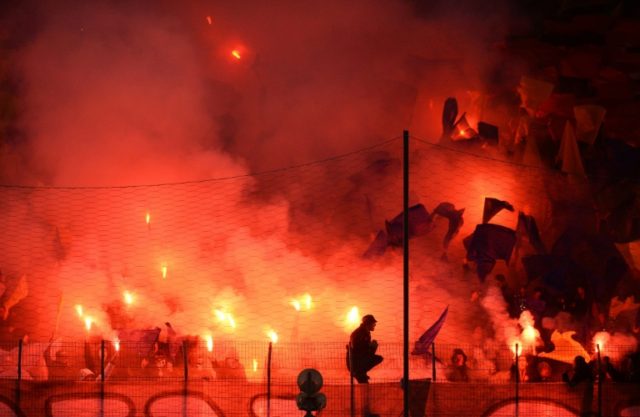Bucharest (AFP) – At 87 years old, Mircea Barbu has no qualms about braving the freezing temperatures for Wednesday’s fiery Dinamo Bucharest-Steaua Bucharest derby, a holdover from the communist era that still stands long after the fall of the Iron Curtain despite the decline of Romanian football.
Like Mircea, tens of thousands of supporters are expected at the national stadium where Dinamo, formerly the club of Romania’s secret police, will host their eternal, Army-founded rivals. “It’s impossible to say how many of them I’ve seen,” smiled the veteran Dinamo supporter.
While the golden eras of the two clubs have long since been consigned to history, their ultimate raison d’etre — biannual clashes with their bitter foes — remains firmly intact.
“The fans still say it: no matter the standings, what really counts is beating Steaua — or Dinamo — and the season is saved,” Helmuth Duckadam, the goalkeeper who saved all four penalties in Steaua’s 1986 European Cup final triumph over Barcelona, told AFP.
The rivalry between the clubs was carved into their identity from their respective births shortly in the late 1940s, with their encounters destined to spice up the Romanian championship as one of the rare forms of entertainment tolerated by the communist regime.
Steaua and Dinamo became the embodiment of a scarcely concealed power struggle between the government’s two most powerful components, the army and the Internal Affairs Ministry.
“There has always been this rivalry of pride, sustained and developed as the two departments gained more and more power,” explained Ovidio Ioanitoaia, the director of Gazeta Sporturilor daily.
– Securitate versus Army –
The confrontation reached its climax during the 1980s when the eldest son of Romanian dictator Nicolae Ceausecu, Valentin, was appointed Steaua’s general manager.
Across the city, Dinamo had a prominent number one fan of their own in Tudor Postelnicu, chief of the Securitate, the country’s formidable state security agency.
“During the 1988 Romanian Cup final, after a Steaua goal was ruled out for offside, Valentin Ceausescu ordered the team to leave the pitch,” recalled Ioanitoaia. A few days later, the federation awarded the club the trophy.
The fallout was that of lasting resentment. When Steaua offered to return the cup to their rivals after the fall of the communist dictatorship in 1989, Dinamo stubbornly refused.
Even today, Dinamo’s hardcore ultra fans celebrate May 10, 1997, the date they set alight the away stand at Steaua’s former Ghencea home, completely destroying it.
Rare transfers between the two clubs have proved hard to forgive. “Those who switch between Steaua and Dinamo are perceived as a a traitor,” recounted Ioanitoaia.
The notion of defecting never crossed the mind of Ion Pircalab, a right winger for Dinamo during the 1960s. “I played at least 30 derbies against Steaua and I still have the same emotions, the same worries and the same desire to win,” he confided.
– Rocked by scandals –
While the 26 league trophies won by Steaua outshine Dinamo’s haul of 18, the latter can boast about producing the leading scorer on 19 occasions, five times more than their rivals.
But the pair share the honours when it comes to scandals ranging from corruption to match-fixing and tax evasion. The issues have plagued Romanian football since the return of democracy, with officials from both sides serving time behind bars.
Without a league title since 2007, Dinamo, currently sixth in the table, have fallen upon hard times financially in recent times and filed for insolvency two years ago.
But the situation is almost more dramatic still at Steaua. While top of the table, last season’s runners-up were booted from their historic ground and stripped of their name after losing a legal battle over their trademark with the defence ministry, having separated from the Army in 1999.
Risky management is not easily forgiven by some supporters, with many staying away from games in protest.
“All my life has been built around Steaua, all that mattered was getting behind the team, even if it meant missing exams or losing a job,” said one disenchanted fan, aged 40.
“And 90 percent of my passion, I lived it during the matches against Dinamo, our true rivals.”

COMMENTS
Please let us know if you're having issues with commenting.